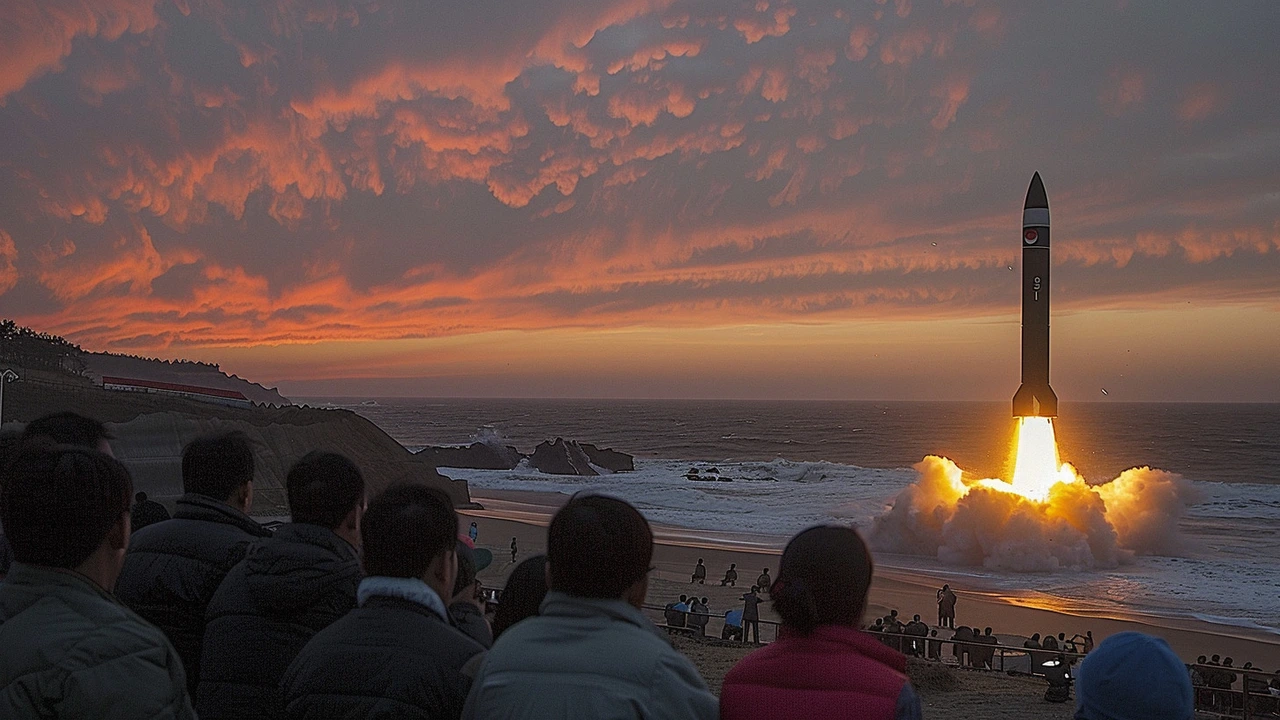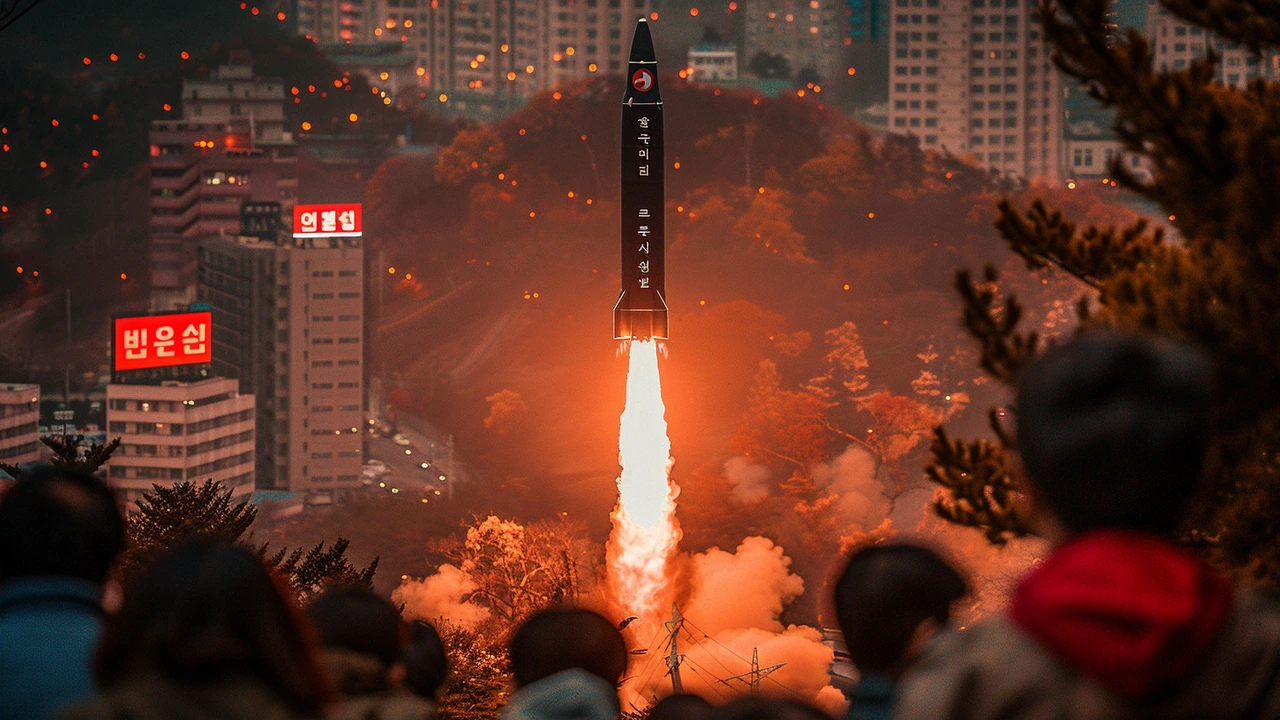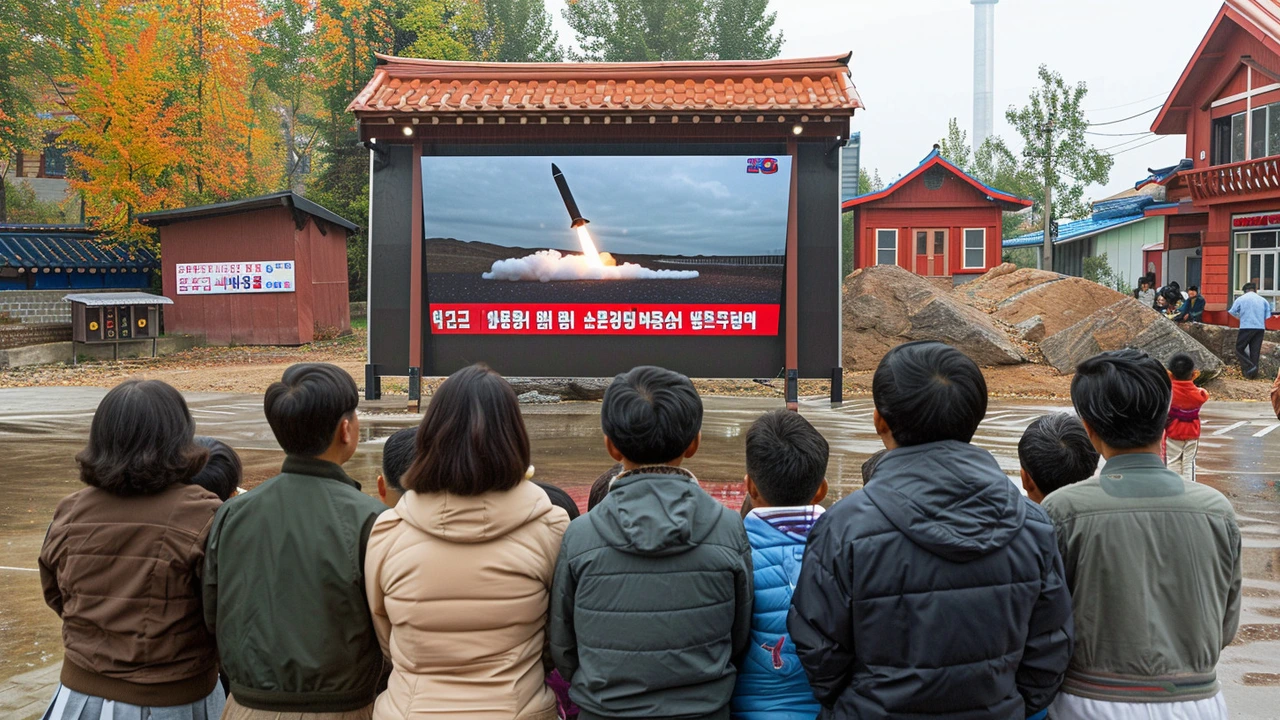North Korea Fires Multiple Missiles Following Satellite Launch Failure
In a bold display of military power, North Korea launched a series of suspected ballistic missiles towards its eastern sea on Thursday. This salvo comes just days after North Korea's attempt to launch a military reconnaissance satellite ended in a catastrophic failure. The launch involved around 10 projectiles, suspected to be short-range ballistic missiles, fired from a region near Pyongyang. These missiles reportedly flew approximately 350 kilometers before splashing down into the waters off the North's eastern coast.
South Korea's Joint Chiefs of Staff stated their military has ramped up its surveillance and vigilance in response to the launch. The South Korean military is closely sharing information with U.S. and Japanese forces. In a communication to the public, Japan's coast guard issued a maritime safety advisory. Prime Minister Fumio Kishida condemned the missile launches, stressing that they violate multiple U.N. Security Council resolutions.

Rising Tensions and Military Responses
The recent missile launches reflect a growing tension on the Korean Peninsula. North Korea has been intensifying its weapons testing, while neighboring countries, notably South Korea and the United States, have ramped up their joint military exercises. These actions have drawn severe international criticism, which North Korea has defiantly dismissed.
In an act of further provocation, North Korea has also flown hundreds of balloons filled with trash towards South Korea. This move appears to be in direct retaliation to South Korean activists who have been sending anti-North Korean propaganda leaflets across the border. These actions signify the deepening of hostilities and a seemingly relentless cycle of provocations and responses.
Failed Satellite Launch and Kim's Determination
The missile barrage follows Monday's failed launch of a military reconnaissance satellite. The rocket exploded shortly after its liftoff, marking yet another setback in North Korea's efforts to develop space-based surveillance capabilities. However, North Korean leader Kim Jong Un has reportedly urged his military scientists to persist in their attempts.
Kim Jong Un's determination to establish a space-based reconnaissance system adds another layer of complexity to the regional security situation. North Korea's Vice Foreign Minister Kim Son Gyong has stated that they will not tolerate any efforts to violate their sovereignty or obstruct their access to space reconnaissance. This hardline stance indicates that North Korea is unlikely to back down from its military pursuits anytime soon.
International Reactions and Condemnations
International reactions to North Korea's actions have been swift and stern. The repeated missile tests and the failed satellite launch have drawn sharp rebukes from neighboring countries and the international community. South Korea, Japan, and the United States have condemned the launches, underscoring the threats they pose to regional and global security.
The United Nations has also weighed in, pointing out that North Korea's missile activities are clear violations of international agreements designed to maintain peace and security. Despite these condemnations, North Korea seems undeterred, continuing to flex its military muscles.

Implications for Regional Security
The recent series of missiles fired by North Korea amid rocket failures and rising tensions underscores the precarious state of security in the region. The exchange of provocations between North Korea and other nations reflects an alarming trend that could escalate into more severe conflicts.
On a geopolitical front, the situation puts enormous pressure on diplomatic channels to find a resolution. Nations involved in the region, including China and Russia, have a pivotal role to play in easing tensions. Diplomatic efforts aimed at restarting talks with North Korea have, so far, yielded limited success. The missile launches and the unwavering stance of North Korean leadership indicate that the path to diplomatic resolution could be fraught with obstacles.

Conclusion
In the face of international condemnation and regional unrest, North Korea's recent actions highlight the critical need for diplomatic efforts to prevent further escalation. The launch of ballistic missiles following a failed satellite attempt serves as a stark reminder of the delicacy of peace and stability on the Korean Peninsula.
While the international community stresses adherence to U.N. resolutions, the resolve displayed by North Korean leadership suggests that the road ahead remains uncertain. The continuous cycle of missile tests and reciprocal military responses keeps the region on edge. As the global community closely monitors these developments, the pursuit of a peaceful resolution through diplomatic channels becomes all the more crucial.


Aaron Leclaire
May 31, 2024 AT 13:50Jasvir Singh
June 1, 2024 AT 03:31Stephanie Reed
June 2, 2024 AT 18:45Steve Cox
June 3, 2024 AT 06:21Mark Venema
June 4, 2024 AT 10:03Brian Walko
June 5, 2024 AT 12:39musa dogan
June 7, 2024 AT 03:24Derrek Wortham
June 8, 2024 AT 17:10Derek Pholms
June 10, 2024 AT 06:53Mark Dodak
June 11, 2024 AT 07:50Drasti Patel
June 12, 2024 AT 03:43